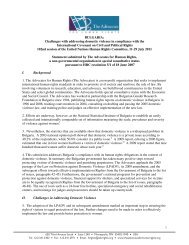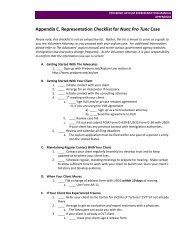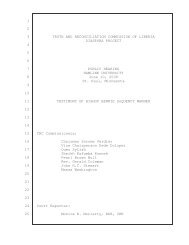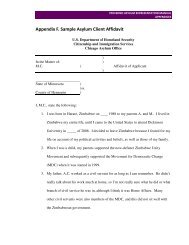HUMAN RIGHTS OBSERVER - The Advocates for Human Rights
HUMAN RIGHTS OBSERVER - The Advocates for Human Rights
HUMAN RIGHTS OBSERVER - The Advocates for Human Rights
Create successful ePaper yourself
Turn your PDF publications into a flip-book with our unique Google optimized e-Paper software.
Observer Page 6Liberian Refugees in Ghana Being RepatriatedAs a part of its Liberian TRC Diaspora Project, <strong>The</strong> <strong>Advocates</strong>has established a connection with the community of Liberianrefugees in the Buduburam settlement outside of Accra, Ghana.<strong>The</strong>re currently are more than 38,000 refugees living inBuduburam. <strong>The</strong> <strong>Advocates</strong> has traveled to the settlement onthree occasions as part of its work with the Liberian TRC.Liberians began arriving in Ghana in 1990 in the wake of theatrocities being committed in their home country. Although theperception from the outside might be that this settlement mustbe well established after 18 years, opportunities <strong>for</strong> employmentand education are scarce. Health and sanitation conditions aresubstandard. A solution <strong>for</strong> those living in the camp has beenelusive – Liberia is not ready to receive them home, they arelargely dependent on remittances and NGO support in Ghana,and resettlement to third countries has been largely stopped.<strong>The</strong>se issues have sparked tensions in the debate overintegration versus repatriation <strong>for</strong> Liberian refugees.At the beginning of 2008, the Ghanaian government announceda multi-million dollar program to integrate Liberian refugeesinto Ghanaian society, as previous repatriation ef<strong>for</strong>ts hadreceived minimal participation. On February 9, a group ofrefugees delivered a petition to the UNHCR and the GhanaRefugee Board. <strong>The</strong> petition stated that they “strongly oppose”integration into Ghanaian society and that they were requestingto be resettled in a third country or to be given US $1,000 inorder to start a new life back in Liberia. In conjunction with thisrequest, hundreds of Liberian refugees – primarily women and<strong>The</strong> <strong>Advocates</strong>’ Cheryl Thomas Invited toU.N. Expert MeetingParticipants at breakout sessionAugust 2008 Volume XX, Issue 2In May 2008, CherylThomas, director of theWomen’s <strong>Human</strong> <strong>Rights</strong>Program, was one offifteen experts invited toa United Nations ExpertGroup Meeting inVienna on best practicesin legislation on violenceagainst women.<strong>The</strong> meeting was convened by the Division <strong>for</strong> the Advancementof Women. Other experts were from Spain, Honduras, Uruguay,Turkey, India, the United Kingdom, Austria, the Netherlands,Philippines, Nigeria, Kenya, Croatia, the Pacific Islands, SouthAfrica, and the United States. <strong>The</strong> meeting involvedplenary sessions with all participants and breakout groups ondomestic violence and sexual assault. Discussions focused onbest practices and lessons learned on legal re<strong>for</strong>m on violenceagainst women.children – held a month-long protest on a soccer field inBuduburam.On March 17th, Ghanaian authorities arrested 630 of theprotesters. <strong>The</strong> detained protesters, virtually all women andchildren, were taken to Kodeabe Youth Camp in the EasternRegion of Ghana. In the process, many families were separated.<strong>The</strong> conditions of this detention area were of grave concern.Reports showed that two pregnant women had miscarriageswhile detained, and others suffered from scorpion bites. Onewoman who had diarrhea was only saved by the intervention ofa human rights activist who called the commander of thesecurity unit <strong>for</strong> her to get medical attention. After interventionfrom UNHCR, the Liberian government, and Ghanaian humanrights NGOs, 90 of the most vulnerable women and childrenwere released after a few days, and ultimately, all of thedetainees were released back to the camp. However, thecrackdown also included arrests of Liberian men from the camp,several of whom were summarily deported, apparently withoutdue process of law in Ghana.After the protests, the Ghanaian government and UNHCR cameto an agreement to close the camp and repatriate the refugeesback to Liberia. <strong>The</strong> unrest highlights the tragic plight ofrefugees who flee situations of long-term conflict. Findingdurable solutions <strong>for</strong> long-term refugee crises must be acontinuing point of advocacy <strong>for</strong> those concerned with humanrights globally.On the first day,all participantspresented theirpapers on variouslegal re<strong>for</strong>mef<strong>for</strong>ts on violenceagainst women.Cheryl Thomaspresented herpaper on the topic,“Legal Re<strong>for</strong>m on Cheryl Thomas with other expertsDomestic Violencein Central and Eastern Europe and the Former Soviet Union.”Participants reported a wide range of activities and progress onef<strong>for</strong>ts to address violence against women. <strong>The</strong>re was agreementamong the group that there is an urgent need internationally <strong>for</strong>standards and best practice models <strong>for</strong> governments and civilsociety groups to use as they embark on legal re<strong>for</strong>m ef<strong>for</strong>ts. Asa follow-up to the meeting, participants are drafting a modelframework <strong>for</strong> legislation on violence against women.
















